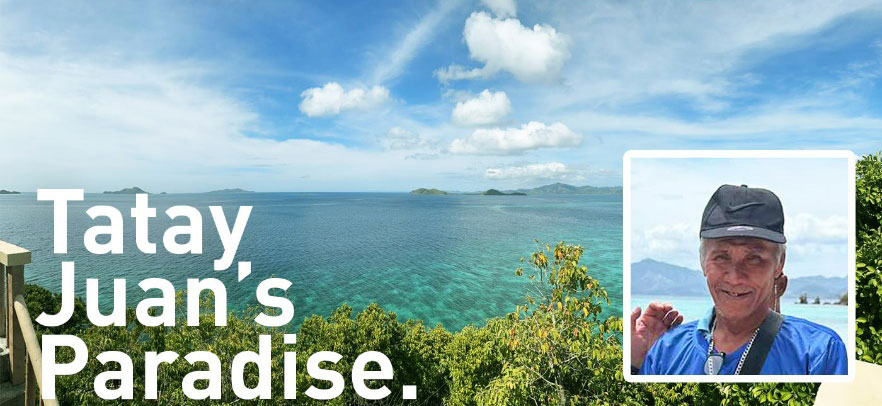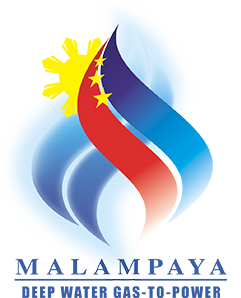
“Ang hindi naiintindihan ng karamihan na sumuko na dito sa SMBB ay, hindi ito biglang yaman na proyekto. Hinde. Kailangan nating magsama-sama, mag-tiis, mag-tulungan, at sumunod sa mga patakaran para hindi lamang guminhawa ang buhay ng samahan, pero para bumalik sa dating kagandahan ang ating kalikasan.” Tatay Juan Comedia, president of the Samahan ng Mangingisda ng Barangay Bulalacao or SMBB says that that’s the secret to the success of their cooperative.
Tatay Juan is not a native of Mindoro – he’s from Masbate. He and his cousins discovered this little nook of paradise while fishing in the early 80s. He fell in love with the island; fell in love with an “ipo” (Island native); married her, and had 10 children who gave him 9 grandchildren. Suffice to say Tatay Juan has seen the island change before his eyes. Sadly, not for the better. Fish used to be bountiful in their area, but the rising demand and the proliferation of illegal fishing practices such as dynamite fishing, have forced their tiny boats to have to go farther-and-farther away from the island. As things got worse, as the head of his family, he was forced to forage in the mountains to provide for his family.
The Bulalacao Marine Protected Area
In 2012, following the events of Typhoon Yolanda which ravaged not just their homes, but their livelihoods, the Malampaya Foundation Inc (MFI) came to Bulalacao with the mandate of helping the community conserve and develop the depleting natural resources in a manner that would sustain both present and future generations.
So, they partnered with the locals of Bulalacao to create a 3,468-hectare Marine Protected Area (MPA). Since 2017, this MPA has constantly won Recognition Awards for Calamianes’ Ecosystem or RACE Awards – including best IP-Managed MPA, Best Initiative MPA, Best Law Enforcement MPA and Best Managed MPA. The Bulalacao MPA is best known for its remarkable recoveries in the local population of commercially important fish, hard coral cover growth, and even certain endangered fish species.
However, MFI recognized that maintaining the MPA did not just call for Ecological Assessment, Enhancement and Rehabilitation; but also, for helping the local populace adapt and embrace this need by addressing and improving their socio-economic status.

Reaping the Rewards
Tatay Juan is not the first president of the SMBB, nor is he the second or third. Many members jumped at the opportunity provided for by the MFI when they came offering training and livelihood projects for the residents of Bulalacao – which was in dire need following the destruction caused by Typhoon Yolanda. Sadly, a lot of people thought that it would be a get rich quick scheme and simply abandoned or left the cooperative. But Tatay Juan and a good number of residents stood true to the cause and a small “pabigasan” was born followed shortly by several Hog Raising Enterprises.
Tatay Juan kept a tight reign over the membership and management of the SMBB. Members who violated environmental laws – such as those who resorted to dynamite fishing or to damaging the mangrove forest, were removed from the organization. Profits were small, but the growth was there and it was these businesses that would see to their survival when the pandemic hit.
The pandemic was doubly hard for Tatay Juan because not only were they unable to fish, but travel restrictions kept the island isolated. Still, he and the members of the SMBB remain grateful for these simple livelihood projects provided for by the MFI which saw them through the dark days of the pandemic.
Today Tatay Juan likes to spend his nights sleeping in the Tourist and Cargo boat provided to them by the MFI in 2019. While it could not function during the pandemic, it is one of the vital means of transport for both tourists and cargo. The MFI transferred ownership of the boat to the MFF in May of 2022. “Malaki ang utang na loob ko sa mga taga MFI at sa tulong na ibinigay nila” says Tatay Juan. ”At sana lumaki pa ang SMBB sa tulong nila.”
MFI host projects/programs that help conserve the environment while providing livelihood options for the Host Communities – or the areas where the Malampaya gas field operates. These host communities include the areas of Palawan, Oriental Mindoro, Batangas and Subic. Among these projects/programs are the Livelihood Alternatives and Mariculture-Based Assistance (LAMBAT), project; the Barangay Aquatic Habitat and Underwater Regeneration Assistance (BAHURA), program; the Sanayan sa Ikauunlad ng Kaalamang Pangkabuhayan (SIKAP), and; the Galing at Negosyo Dulot ay Asenso (GANDA) project. Since MFI initiated these projects/programs in 2014, they have been able to help improve the lives of 1,128 host communities. Another MFI program called Tanglaw Paaralan provides an off-grid educational experience for Public Schools through solar-powered multi-media equipment. MFI’s Tanglaw project operates today in 4 Host Community Schools and is pleased to report that all 4 schools report a marked improvement in the test scores of their students.





